
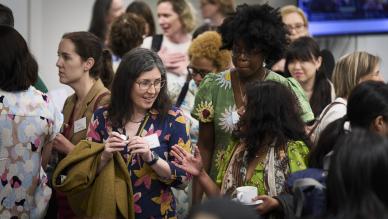
Women in Leadership – Lessons in Courage, Compassion and Change
By Professor Angela Thomas OBE FRCP Edin
On 19 June 2025, I was delighted to attend ‘Women in Leadership’, a powerful and stimulating event held jointly by the Royal College of Physicians of Edinburgh and National Education Scotland. I listened to seven women share their stories and was impressed by their candour, strength, and unwavering commitment to create change and empower others.
It’s not often we get the chance to hear first-hand stories of courage and leadership. I hope this blog can share some of the inspiration we felt that day.
Dame Asha Khemka - “India made me, Britain enabled me: my journey through leadership”
Leadership Born of Resilience
Dame Asha Khemka’s story is one of leadership and persistence. Beginning her life in a village on the India-Nepal border, Asha was orphaned at 12, married at 15, and a mother of three by 21. This left her living a life defined by duty and quiet resilience. When she moved to the UK in the 1970s, she spoke no English and had to navigate an unfamiliar world while raising a young family. But she never gave up learning.
In her 40s, she returned to education, walked into a college to ask for a job, and began a career that resulted in her becoming Principal and CEO. She didn’t seek ambition for the sake of it – she sought to transform communities, raise aspirations and build opportunities. Her message was simple yet profound:
“Your starting point does not define your destiny—your self-belief does.”
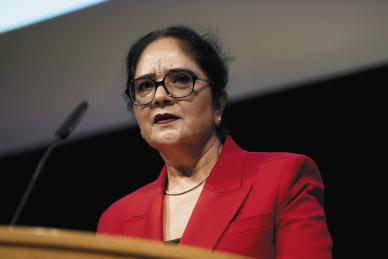
Sally Magnusson - “A Woman in the media”
Giving Voice to the Unheard
Sally Magnusson MBE, broadcaster and author, reflected on a career that balanced sharp journalism with the realities of raising five children. She admitted that, for much of her career, she resisted framing her work through the lens of womanhood. But that changed when she became a carer for her mother, who was living with dementia.
Her memoir about that time was not only a personal act of grief and love, but a turning point. Inspired by her mother, she founded a charity to support others living with dementia using the power of music. Since then, she has dedicated her writing to recovering the lost stories of women in history - those who shaped communities, yet are not documented.
Sally’s story challenged us to value emotional labour, to listen with empathy, and to celebrate the quiet strength of women whose work often goes unseen.
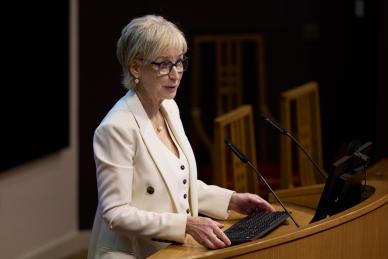
Dame Helen Stokes-Lampard - Leadership crossroads and self-belief
Embracing the Crossroads
Professor Dame Helen Stokes-Lampard offered a refreshingly honest take on how to navigate career uncertainty with curiosity and integrity. From GP to academic to policy leader, and now Chief Medical Officer for Health New Zealand, her path has been anything but linear. At each crossroad, she faced questions of identity, doubt, and direction.
She spoke about dealing with her experiences with power. Her response to hearing a female colleague being called “disproportionately powerful” (which raised a few wry smiles), was to stress the importance of holding these comments with dignity rather than letting them shrink your self-belief. We all have doubts, and allowing ourselves to fail is crucial in finding the next step:
“Not every decision has to be the right one - it just has to be considered.”
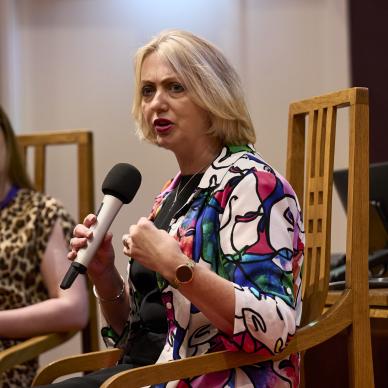
Kara Stewart - Gender-based violence
Would Your Institution Pass the ‘EmilyTest'?
Kara Stewart from the charity EmilyTest told a story that was both heart-breaking and essential. Emily, a bright young law student, died by suicide after months of abuse from a controlling partner. Despite knowing something was wrong, the seventeen people around her did not intervene.
It is essential we share these stories so that we can work together to recognise the signs of domestic violence and how to offer the right support. Kara shared how the charity is now working with universities, schools, and healthcare systems to develop gender-based violence (GBV) charters, training programmes, and support networks. Her talk was a sobering reminder that leadership is about safeguarding. That culture change is as important as policy. And that silence can cost lives.
In healthcare, we are not immune to these issues. GBV affects our staff and our patients. We must ask ourselves: are we creating environments where people feel safe, seen, and supported? Would these environments pass the ‘EmilyTest'?
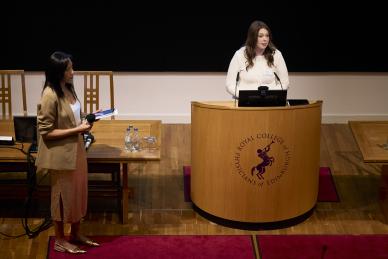
Dr Olamide Oguntimehin - “Intersectionality with race”
Leadership Through Inclusion
Dr Olamide Oguntimehin, founder of Melanin Medics, reminded us how race, gender, and class intersect to shape leadership journeys in medicine and the wider world. Growing up in Luton, she faced the subtle but persistent message that her presence in medicine was an exception, not a norm.
Her concept of “paths and ladders” was powerful. Paths provide access, but ladders provide support - mentors, networks, allies, and the systems that pull others up. She challenged the idea that representation alone is enough, advocating instead for structural change and intentional inclusivity.
Her leadership reframed ambition not as taking space but making space.
“I refused to count myself out,”
..she said, and encouraged us to do the same for those around us.
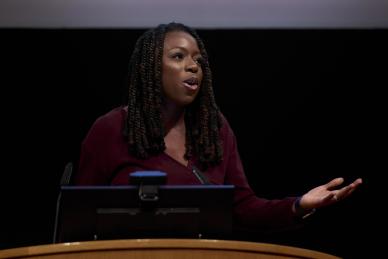
Dr Anna Dover - “Supporting neurodivergent talent”
Neurodiversity is Not a Deficit
Dr Anna Dover offered a powerful reflection on neurodiversity, weaving together her professional insight and personal experience. She highlighted how systems built around neurotypical expectations often fail to recognise the many strengths of neurodivergent individuals such as deep focus, creativity and pattern recognition.
She spoke of how women, particularly women of colour, are frequently underdiagnosed or misunderstood. Many mask their traits or work twice as hard to “fit in”, at the cost of their wellbeing. She urged us to move from deficit thinking to a strength-based approach. Reasonable adjustments, inclusive design, and better awareness are not examples of “special treatment” but are essential tools for tapping into the full talent of our workforce.
Her message is clear: neurodivergent clinicians are not problems to be fixed but people with immense potential. We must build environments where everyone can thrive.
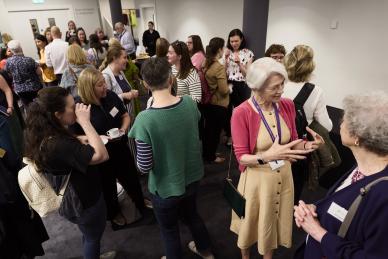
Anne Dickson - “Assertiveness”
Why Do We Keep Silent?
Psychologist and author Anne Dickson describes assertiveness not just as a communication skill, but as an act of declaring our position to drive social change. Finding our voice and creating spaces to be verbally, physically, and psychologically assertive is deeply personal work that is essential to good leadership.
When we learn to treat others as equals, even in unequal power dynamics, we shift from silence and dominance to dialogue and inclusion. We must practise a new model of leadership in order to challenge aggression-based hierarchies - one grounded in equity, mutual respect, and the courage to speak up.
Final Reflections
What united all these speakers was a shared ethos; leadership as courage in action. Whether overcoming poverty, discrimination, trauma, or exclusion, each woman offered a model of leadership grounded in service, resilience, and truth.
As I left the event, I was struck how necessary the telling of these stories is. They left me asking: how can each of us lead in ways that are more inclusive, more authentic, and more compassionate?
For our College, and for our profession, the answer lies in continuing to learn from each other, not least from voices that have spent too long unheard.
Let us take these lessons forward - not just in what we do, but in how we lead.
The College would like to thank everyone who attended and made it the success it was.
We were particularly delighted to be sponsoring a group of female Afghan medical students to attend. The group are studying medicine in Scotland and are part of a cohort of 19 female Afghan medical students barred by the Taliban from completing their university studies in Afghanistan, who came to Scotland in 2024 to complete their medical training.




